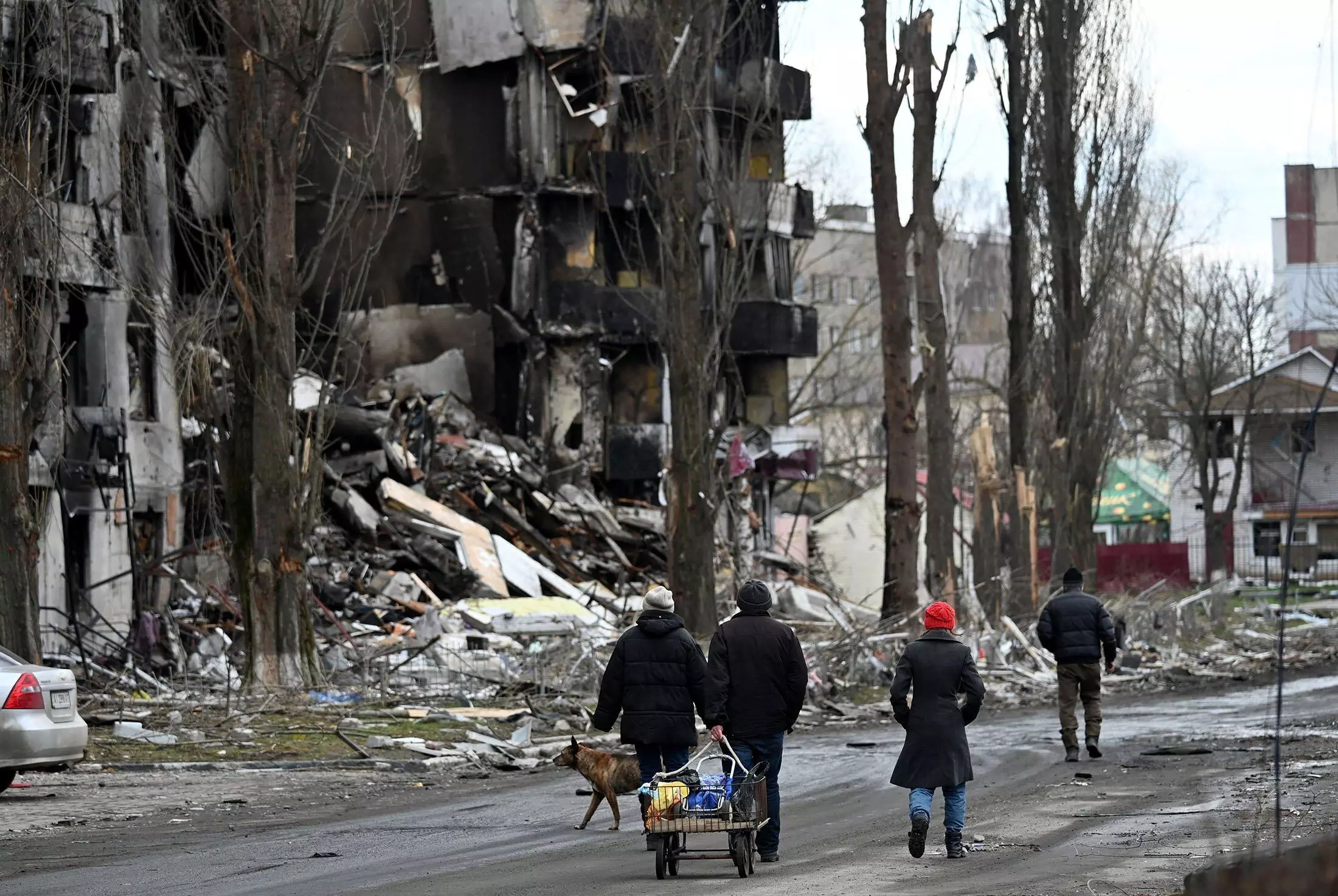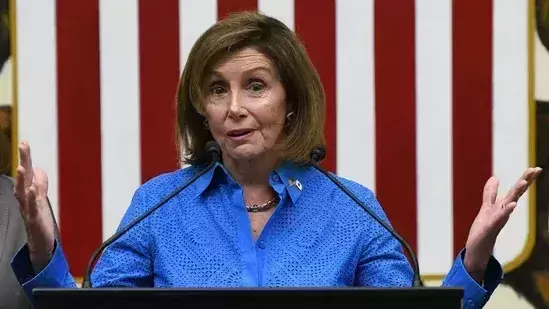
Disaster drawing near !
text_fieldsImage for representation only
Bertrand Badie is a French political scientist and international relations specialist. He is one of the most renowned French specialists in international relations. According to him four events that changed the world in 2022 are still haunting the world. They are the results of the United States’ exit from Afghanistan, the Russian war on Ukraine, the remarkable change in China’s military and strategic behavior, the continued rise of the extreme right, including the prime minister in Italy, and Netanyahu’s return to the presidency with the extreme right government in Israel.
A member of the American Republican Party said that the way the United States got out of Afghanistan encouraged President Putin to attack Ukraine! In other words, the world powers realized that the United States was no longer ready to wage war anywhere. And George F. Kennan, who was the American ambassador to the Soviet Union several decades ago, mentioned in his book "Russia and the West" that Nato’s expansion eastwards brought no gains to the West. Instead, it sowed the seeds of strife. These resulted in Russian invasion of Ukraine . Now, Ukraine is on the path of destruction, and Europe is rapidly on the path of bankruptcy due to the worsening economic crises, the most prominent of which are the energy crisis, the refugee crisis, and the escalation of human losses among the warring sides !
The Russian-Ukrainian war now completes its first year and the Western-Russian confrontation is taking an escalating turn every day, making the old continent the scene of an escalating confrontation in various forms between the Western Alliance and the Russian Federation. We do not yet know when and how this geostrategic confrontation will end in the near or distant future. Rumors are abuzz due to many indications that this year may witness the possibility of another Ukraine scenario in Taiwan, or what some call an Asian Ukraine. This trend is prompted by the increase in US-Chinese tension and the policy of red lines declared by the People's Republic of China with regard to Taiwan, as well as the increase in the volume of US military aid and sales to Taiwan, which contributes to raising the level of military readiness for the latter. This is happening in light of an escalation in the diplomatic rhetoric on both sides of the conflict.
The U.S. House Speaker Nancy Pelosi visited Taiwan and met Taiwanese President Tsai Ing-wen in August 2022 in defiance of Chinese warnings for the trip not to take place. Angered at what it perceived as U.S. support for Taiwan's de facto independence - a red line for Beijing - China launched war games near the island it claims as its "sacred" territory shortly after Pelosi left.
China's military for the first time fired missiles over Taipei, flew waves of drones over some of Taiwan's offshore islands near the Chinese coast, sailed warships across the median line of the Taiwan Strait and surrounded the island in what Taiwan's military said it amounted to a practice of "blockade." Military tensions had not been so high between Taiwan and China since Beijing fired missiles into waters off Taiwan's coast ahead of the 1996 Taiwanese presidential election, as the Chinese government tried to dissuade people from voting for Lee Teng-hui who it viewed as a separatist. That backfired and Lee handily won the election. China likewise views Tsai as a separatist for refusing to accept Beijing's long-standing position that China and Taiwan both belong to "one China". The government of Taiwan - formerly the Republic of China - maintains that as the island has never been ruled by the People's Republic of China its claims of sovereignty are void. Tsai says only the island's 23 million people can decide their future through democracy, and that while she wants dialogue and peace with China and will not provoke, Taiwan will defend itself if attacked .
Any war over Taiwan, a major producer of semiconductors, has the potential to crush the global economy. It could draw the United States and its allies into direct confrontation with China's People's Liberation Army, the world's largest military, which is increasingly well-equipped. China has long said Taiwan is the most important and sensitive issue in its relations with the United States, a message Chinese President Xi Jinping reiterated to U.S. President Joe Biden when they met in Bali at the end of 2022. The United States, like most countries, has no formal diplomatic ties with Taiwan, but is bound by law to provide the island with the means to defend itself. The United States has long stuck to a policy of "strategic ambiguity" and not making clear whether it would respond militarily to an attack on Taiwan. However, Biden said in September 2022 that U.S forces would defend Taiwan in the event of a Chinese invasion, his most explicit statement on the issue. China has never renounced the use of force to bring Taiwan under its control, which Xi reiterated at the 20th congress of the ruling Communist Party in October.
Anti-China sentiment continues to build in the United States, and in its newly Republican-controlled House, along with support for Taiwan. If the probable new U.S. House Speaker Kevin McCarthy follows in Pelosi's footsteps and visits Taiwan that would trigger yet more fireworks across the Taiwan Strait and between Washington and Beijing. Next year, both Taiwan's main political parties will also be gearing up for presidential and parliamentary elections in early 2024.
The main opposition party the Kuomintang, or KMT, which traditionally favors close ties with China but vehemently denies being pro-Beijing, hopes it can get back into office after two terms in opposition following a strong showing at local elections in November.
Political observers ask about China’s ambitions, and seek to know its grand strategy to achieve them. If it has a strategy, how does it shape it, and what is the United States response to it- these are basic questions for American policymakers grappling with this century’s greatest geopolitical challenge. Because knowing an opponent’s strategy is the first step to countering it. Former Brookings Fellow Rush Doshi, in his “The Long Game: China’s Grand Strategy to Displace American Order” suggests that three broad “forms of control” of a hegemon regulate the behavior of other states. They are the coercive capability (to force comliance), consensual inducements (to incentivize it), and legitimacy (to rightfully command it). For rising states,China is an example of acting tactfully to displace American hegemony. It consists of two broad strategies generally pursued in sequence. The first strategy is to blunt the hegemon’s exercise of those forms of control, particularly those extended over the rising state and the second is to build forms of control over others .Tan Mingran, a professor of philosophy, and Social Development, at Shandong University, Jinan, China. points out that the Chinese economic model has quickly extended beyond China’s borders. “In their quest to mimic Chinese success, countries as diverse as Brazil, Russia and Vietnam are copying Beijing’s activist industrial policy that uses public money and foreign investment to build capital-intensive industries.”15 African countries have directly invited China to establish special economic zones. The reason is that the Chinese model provides rapid growth, stability, and the promise of a better life for its citizens, which are goals toward which many developing countries are striving.
Undoubtedly, the popularity of this model will inevitably shrink the influence of the Washington Consensus, challenging the dominant Western values. Historically, Great Britain and the United States have both relied on economic power to achieve world hegemony and transform the world with their culture and values.
The Russia-Ukraine war has opened up some major opportunities for China. A weakened Russia may drive Moscow away from the West and closer to Beijing as China’s “junior partner,” which is exactly how China has seen the relationship over the years. Furthermore, the war has triggered political, economic, and financial reactions in Europe and the United States, sometimes in unprecedented ways. It goes without saying that the west should recognize the principle of the indivisibility of security, which holds that the security of one country shall not be fulfilled at the expense of the security of other countries; and that this principle must become the basis of new international relations.
But, starting from the mid-2010s, democracies all over the world have turned towards the right, electing representatives that stand in stark contrast to those that pushed for globalization and international cooperation two decades earlier. Right-wing populism has different features in different countries. It’s somewhat simplistic, to say that all of the parties, movements, and leaders emerging in this historic shift belong to a single political trend. It is true, they do have some elements in common. They share xenophobic, nationalistic traits, a tendency toward authoritarianism, aggressive leadership, and an anti-elitist message. All over Europe, the past few years have seen a noticeable growth in xenophobia, particularly in reaction to asylum seekers and immigrants. Simultaneously, there’s been a growing rejection of European cooperation, propelling the 2016 vote in favor of Brexit in the UK, and the rise of far-right movements all over the continent. In the United States, President Donald Trump - whose rise to power, helped by right-wing populist strategist Steve Bannon- has promoted an anti-immigrant agenda. The American president did not shy away from incendiary comments and under his presidency, hate crimes were on the rise. In Brazil , just after three years in prison , Luiz Inácio Lula da Silva was elected president. He engineered a stunning political resurrection over right-wing incumbent President Jair Bolsonaro. But, supporters of right-wing former President Jair Bolsonaro attacked government buildings in Brasília, the country’s capital, destroying property and vandalizing art and offices of legislators, the presidency and the Supreme Court, demanding that Bolsonaro be reinstated.
The Brasília riot was not simply a repeat of the events in the U.S., experts say – it was different in important ways that are unique to Brazil. However, it also illuminates how far-right movements may be influencing politics and culture across the borders.
Most citizens rely on the media in order to form an opinion about the politicians or political parties. This makes the media a crucial tool for politicians to disseminate their message and to build up their image. It is by the media prominence that they profoundly influence the public. The more salient they are to the public eye, the better they can convince citizens that their standpoints matter.
Research has shown over the years that voters’ knowledge of the various politicians is dependent on the amount of media attention they get. Hence, by making certain characteristics of a political candidate more noticeable, the media shape candidates' images. To appear effective and legitimate, right-wing populist party leaders use the media as a platform. Fascist parties receive a lot of media coverage naturally because their provocative speech and viewpoints make for eye-catching headlines. They utilize social media and the Internet to their advantage. The essence of Fascism is authoritarianism. It suppresses independent union activities and civil rights. So, those who believe in liberal principles and moral values have to form a democratic platform to fight and defeat Fascism.



























